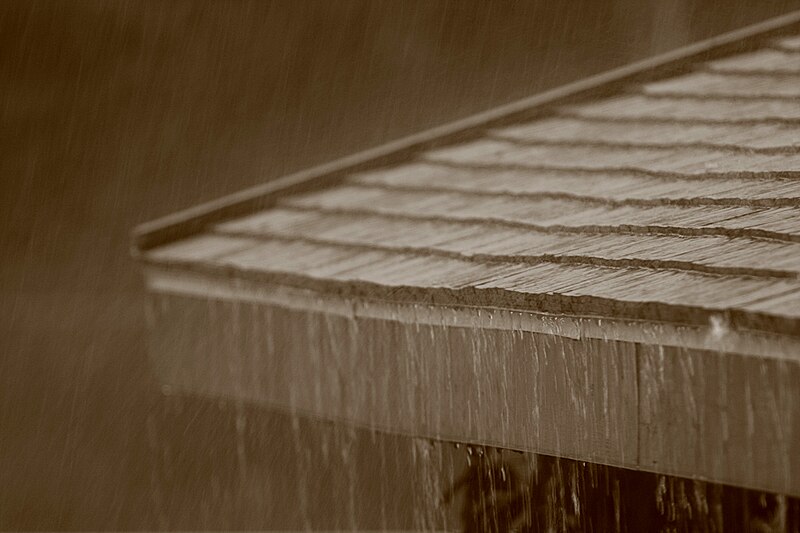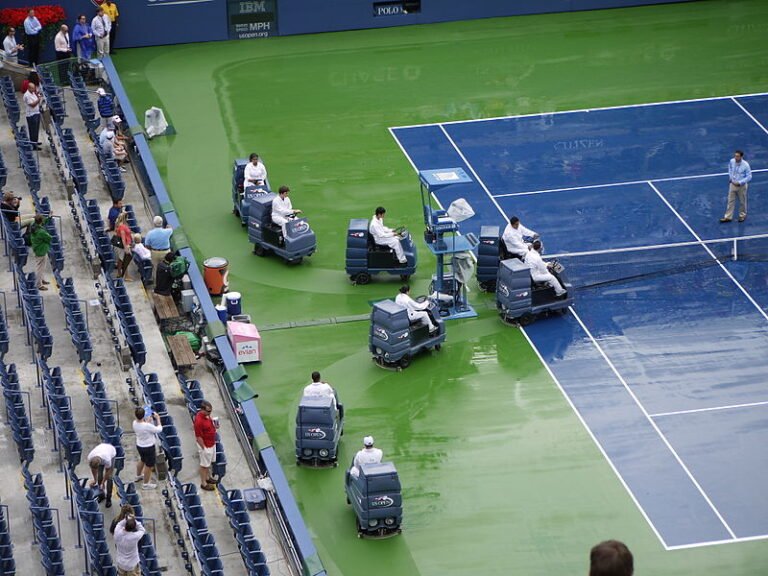Tennis is a super engaging sport, and each time there is a major tournament, fans and enthusiasts come out in droves to watch their favorite players compete. A day out at the tennis is a treat and something I look forward to, especially the majors.
However, sometimes events outside of the game can affect the match, leading to an interruption or suspension. When this happens, many fans may find themselves wondering what the term “suspended” means in tennis and why it happened.
In this article, we will look at suspended play, what causes play to be suspended, and another type of suspension that you may not be so familiar with… read on!
What Happens When Play is Suspended?
Tennis matches can be disrupted and, in some cases, even suspended when an external threat like rainfall or darkness occurs. If a match has to be put on hold because of any reason, it is considered suspended.
It will have happened to you no doubt, you are playing a game and grey clouds appear overhead and suddenly there is a downpour. You run for the clubhouse and wait until it passes. This is also a suspension in play.
On the professional tour it is rare for a match to be canceled, in most cases, suspended play will be resumed at a later time once the threat has been mitigated. Tennis players, officials, and fans often need to stay patient while they wait for play to commence again, but fortunately, with modern technology, most tennis courts have retractable roofs to shield the players and the fans from the weather.
The tournaments that struggle are those that experience very little bad weather normally and suddenly get bad weather, Think Indian Wells which enjoys year-round sunshine!

What Causes Play to Be Suspended?
Several factors can cause the suspension of a tennis match.
- The most common factor is bad weather or light, mostly during an outdoor match. Thunderstorms, rain, and sunset can all lead to an interruption of play as player and spectator safety are the most important aspects.
- Play may also be suspended if there is an injury to a player on the court. The game will stop and the player is allowed to receive medical treatment. Players are normally allowed three medical timeouts per match and each time-out has a maximum of three minutes. During this time the tournament’s medical professional may come to help the player who has called the timeout.
- A player can be suspended for a particular action that goes against the tennis code of conduct. Unsportsmanlike behavior, foul language, and cheating are all examples of behavior that can lead to a player’s suspension. Finally, security and safety concerns can also lead to the suspension of a match.
- I have also seen play suspended when an individual has been taken ill in the crowd and the stadium needs to get this person out for medical assistance ASAP.

Do Players Get Suspended?
Players can also face suspension due to violations of ethics and integrity in the sport. For instance, if a player is found to be involved in betting on tennis matches, this is considered a serious breach of conduct. It undermines the spirit of fair competition and can lead to severe penalties, including suspension.
Tennis maintains a strict anti-doping policy. If a player tests positive for performance-enhancing drugs or substances listed as prohibited, they can be suspended from play. The aim of this policy is to ensure a level playing field and uphold the integrity of the sport. The duration of the suspension can vary depending on the severity of the offense and the player’s past conduct.
Who decides if Play Should be Suspended?
The umpire holds a pivotal role in deciding the suspension of play and players in a tennis match. This person is the final authority on all matters about the enforcement of rules during the match.
When it comes to weather conditions affecting play, it is typically the umpire who, after consulting with tournament officials, decides whether the conditions are safe enough for the match to continue. They all monitor the light, rain, or other adverse conditions, always prioritizing the players’ safety. You may have seen the tournament referee come onto the court at a tennis tournament to talk with the umpire.
As for player suspensions, the umpire has the authority to disqualify a player for a serious violation of the code of conduct.
In 2019 Nick Kyrgios received a suspended 16-week ban and $25,000 fine for “aggravated behavior”, subject to a six-month probationary period. The hot-headed Australian smashed two rackets on court at the Cincinnati Masters defeat by Karen Khachanov. This is a good example of where a suspension may come into force against a player.
The great thing about tennis is that this is extremely rare for suspensions to happen, The game is noncontact and nonviolent so most matches passes with good grace and full respect between players. There is also great respect for umpires and lines judges and this allows matches to run smoothly the majority of the time.
Frequently Asked Questions:
What happens to the scores when play is suspended?
The scores are usually frozen, and the match resumes from where it stopped, once play continues.
What happens if the suspended match cannot be completed?
If suspended play can not be concluded on the said day, it can be continued on another day until the match is over. I have not known a tournament to have such bad weather that it cannot continue.
Final Thoughts:
In conclusion, the term “suspended” refers to several different areas of a tennis match.
It can simply be a pause or interruption in a tennis match, caused by external factors like weather, injury, or disciplinary action.
Suspensions can affect gameplay, scorelines, and even the tournament’s outcome. However, with modern technology and safety protocols, officials have many ways to tackle the suspensions, be that retractable roofs or rescheduling to play at night time (like they do in the US Open).
In summary, any tennis fan should be aware of the possibility of suspended play in a tournament, or just socially, and understand the rules and procedures associated with it.




Comments are closed.